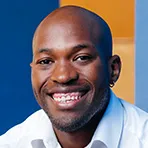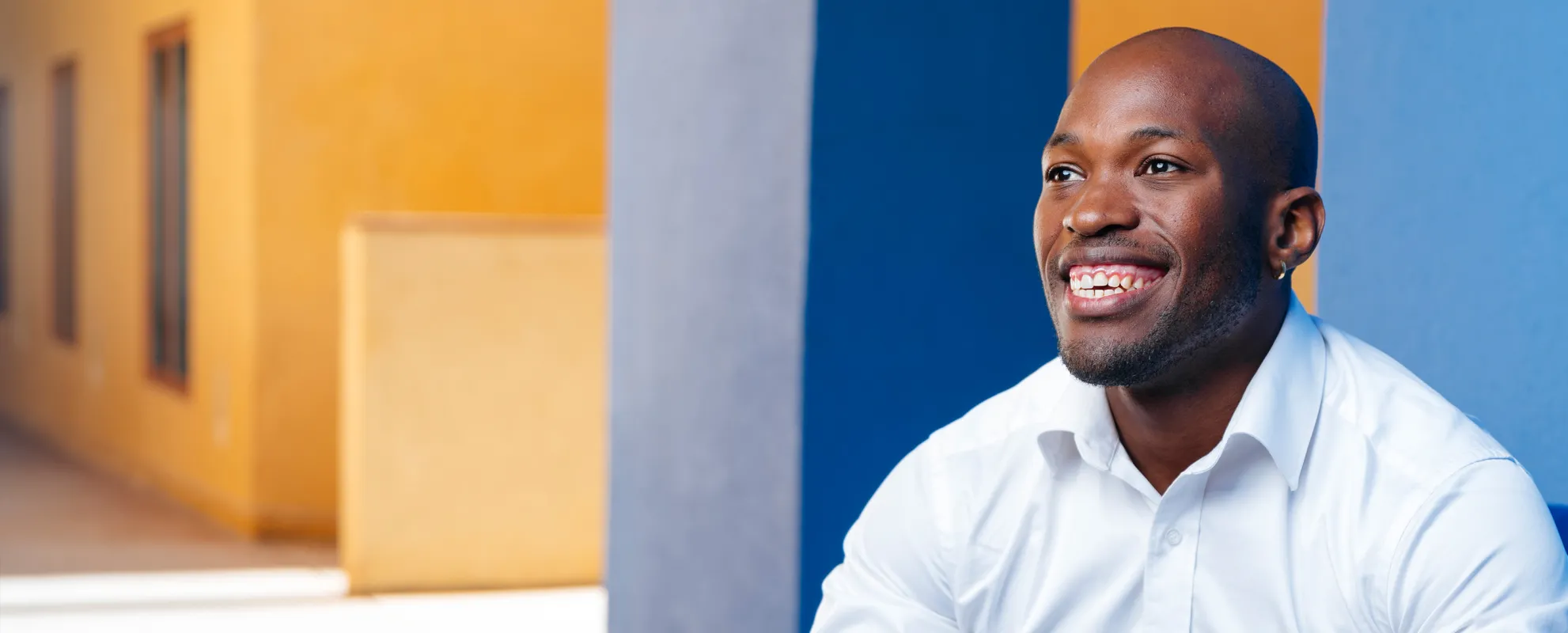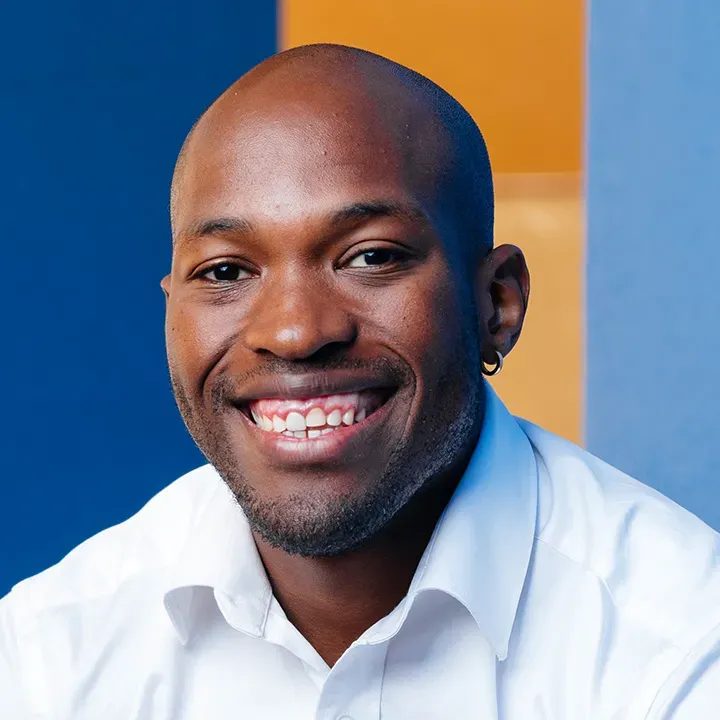South Africa’s Phuthi Tsatsi is of two minds when reflecting on his pursuit of dual master’s degrees in electrical engineering and business at Stanford.
“The way I think about the two schools is that the MBA experience is experiential,” says the Johannesburg native. “You have classmates, guest speakers, and interactions with your professors. The engineering side is more knowledge-based. You’re not there to experience things but to learn hard skills, whether that’s circuit building, coding, or electronics. The way you approach those is different. One requires you to be an extroverted networker, the other an introverted thinker.”
Tsatsi eventually hopes to meld his two minds by helping rural African communities get access to off-grid solar energy, which in turn will help access the capital that could make industrialization and economic prosperity possible.
When did you know an MBA from Stanford GSB was something you wanted to pursue?
I realized the value of an MBA during my time at CrossBoundary Energy. The two founders started a fund with the idea that they wanted to address local challenges with capital. The switch went on for me when they were able to raise a significant round of equity investment through the Stanford network. They engaged with people from previous classes, looking at opportunities in Africa, and that led to investment in the fund. That helped me realize the power that exists within the Stanford network.
How do you manage the academic workload and commitments involved in pursuing both an MBA and an electrical engineering degree?
It’s been a challenge. It requires prioritization. The GSB is an incredible universe where there’s so much to do all the time, so many shiny objects. I’m curious by nature and want to know a little bit about everything, but I realize that I have to prioritize.
Did your career goals change once you got to business school?
They changed over time. There are 600 million people without access to electricity in Africa. That’s about 50% of the population. Early studies show a high correlation between total GDP growth and energy access. The World Bank estimates that sub-Saharan Africa loses about $85 billion a year just on energy outages. My initial hypothesis has always been that if you get people energy, GDP follows. But it doesn’t help if you give people energy, but don’t give them productive ways to use that energy. There’s a more fundamental question, which is how do you unlock industry in Africa? That pivot started during my MBA, and the conversations I’m having now are broader than just energy access.
Why is Africa lagging in that regard, and why do you think solar energy development is such an important part of the solution?
African cities are geographically distributed, and the terrain is relatively complex. A lot of the infrastructure is centered around urban areas, but it hasn’t grown over the years as the population rose, so there’s not enough infrastructure in the urban areas, or beyond in the rural areas. The typical way that most areas have grown is there’s some major base industry, typically mining or chemical manufacturing, and everything scales up from that base. In a lot of the African markets, they haven’t had that base in the rural areas. So that’s the most important challenge.
How does the terrain complicate energy transmission?
The typical way you solve transmission challenges is to stick a large transmission line from urban areas to these rural areas, and from that you build out your grid. But for various reasons, utilities can’t fund that expansion. Even if they could, you’re dealing with geographically complex and sparsely populated rural areas, so the challenge of having to do all that work to build the transmission line to connect those homes is often challenging and expensive using traditional methods. Where solar comes into that equation is with mini-grids, which are decentralized. The other reason solar is great is because it’s highly financed. You have a solution that works, and then you have a solution that actually has enough capital to be able to deploy the solutions. It’s a win-win in terms of business, economic, and environmental sense.
Has anything at the GSB convinced you to change your approach to solving those electrification problems?
I took the macroeconomics class taught by Professor Chad Jones. I’m an engineer, and I’ve never done economics. One of the most powerful things from that class was the idea behind how a currency is valued, and its underlying value. To have a strong currency, you need a strong reserve. That’s typically a lot of dollars in your bank account. You actually gain those dollars from trade — I will sell you gold, and in exchange for that, you’ll give me dollars, and with that, I’ll increase my reserve currency and deploy those dollars to infrastructure projects or use those dollars to get capital at a lower rate.
How would you apply that idea to electrification in Africa?
If you want to create this prosperous version of Africa, you need to figure out what are the high-value things that you’re trading with the rest of the world that get you more dollars in your reserve. As Professor Jones shared the concept of trade balances, I was drawn to my time working in a rural mini-grid in Nigeria. While the community had access to electricity for over 5 years, they still lived in significant poverty. Interestingly, the community had seen prosperity for 2 years when they were provided with agricultural management support for 2 years, and as a result used electrical machines for processing their harvest more effectively for sale. The minute the support was pulled, electricity use dropped, and the community returned to rationing food and the little money they had. Electricity can help you get there, but it’s not the whole solution. Being in this class helped me start to figure out more of what a potential solution could look like.
While your primary interests are in energy and climate, you’ve said your longer-term goal is to bolster economic development in Africa. Can you elaborate on why those two things work together?
It started with energy access, which is tied to economic prosperity. Then it shifted over time to realizing that part of that nexus will always be some form of industrial development. Electricity is just one part of that equation. When you look at where the world is shifting, there’s a lot of capital that’s available to incubate a lot of these technologies. That also makes it a perfect space to be able to think about the technologies that you build in Africa to help it industrialize.
Why do you feel leveraging blockchain is the right way to finance your vision to electrify Africa?
First, blockchain has a lot of useful applications in Africa. It’s particularly useful in terms of reducing corruption and managing capital. Blockchain is more efficient and transparent. In the energy case, it’s particularly interesting within the mini-grid equation. Blockchain and decentralized computing use a lot of energy and are in constant search of the cheapest green energy source. On the other side, in the mini-grids, you actually have this problem where there’s not enough of an uptake in the initial stages of the mini-grid, so 40% to 60% of the solar energy produced is wasted. You have this perfect marriage where there’s a technology that needs a lot of electricity to function, and you have these grids where not enough energy is consumed. When you marry the two you get this symbiotic relationship. We actually piloted this project over a summer and learned a lot about proving how viable this model could be if done right.
Have you benefited from any especially inspiring mentors in your career?
I worked with a managing director and partner at Boston Consulting Group, on my first energy project, and he really got me into the energy space. From him, I learned how powerful it is when someone believes in you more than you believe in yourself. He’s part of the reason I ended up applying to Stanford because I didn’t think it was a place I’d be able to get into. The second is the chief commercial officer at CrossBoundary Energy. He showed me the power of vulnerable leadership. The common theme is getting the most out of people and pushing them in ways that they also feel inspired. He is also a black male, and having him as a mentor helped me navigate some of my challenges. When is the right time to address promotions, versus letting them go? When is the right time to stand up for yourself, and the right ways to be firm? We sometimes shy away from those conversations in black communities because you want to keep the job and not ruffle feathers. Having someone who was able to identify with that experience and also show me how to stand up for myself was really powerful.
How will you stay involved with the GSB after you graduate?
In my ideal world I’d love to give more to the GSB in the Africa space. I’d love to contribute to the growing GSB Africa community, sharing interesting innovations and what the energy space looks like. In the short to medium term that’s how I think I can add value. In the longer term, I’d really love to create more linkages to Africa, to connect with some of the larger institutes of excellence here where there’s incredible talent but which don’t have access to the right networks to be discovered, and get the opportunities I was afforded.
Photos by Elena Zhukova


